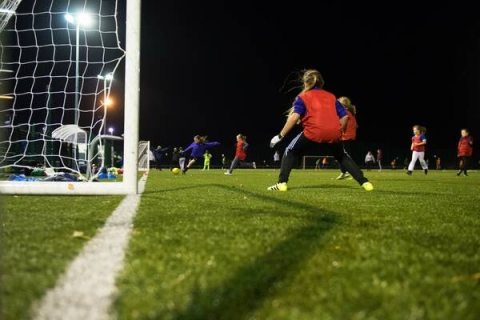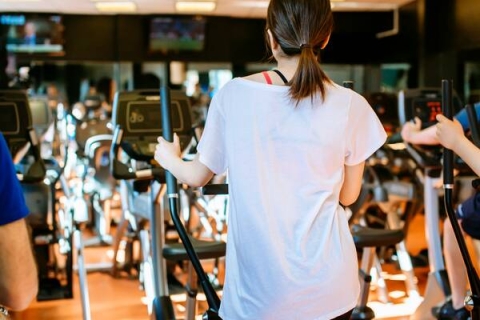
Key information
For:
starting September 2026
UCAS code:
C611
Typical offer:
Relevant HE study leading to a Level 5 qualification in a Sport related subject
Showing content for section Overview
Overview
Sport managers bring business knowledge and commercial expertise to the world of sport.
With a Level 5 qualification – such as an HND or Foundation degree in a subject related to sports or business – and the ambition to work in sport management, you can earn a full Bachelor's degree on this BSc (Hons) Sport Management top-up course.
By developing skills in sports entrepreneurship, management, marketing, analytics and more, you'll graduate with the knowledge, understanding and practical experience for a career in sport management and a range of related sectors.
Sports science at the University of Portsmouth is ranked 3rd of all post-1992 universities for research quality
Research Excellence Framework (REF) 2021
Course highlights
- Have the chance to take part in research programmes run by internationally recognised sports organisations such as UEFA, the FA and the England and Wales Cricket Board (ECB)
- Experience teaching that's driven by current practice and taught by lecturers who have delivered sports management schemes in the community
- Boost your CV, enhance your professional network and share your sporting skill in the local community through our coaching, mentoring and volunteering scheme
- Train and coach within our extensive sports facilities, including a 100-station gym, fitness studios, and a new sports centre featuring a ski simulator, climbing wall and 8-lane swimming pool
Top 30
for student satisfaction
(Times Higher Education, 2024)
Recognised by:
This course is in the top 10 for Tourism, Transport, Travel and Heritage Studies in the Complete University Guide League Tables 2022.
Contact information
Contact AdmissionsClearing is open
This course is available through Clearing.
Clearing 2025 is now closed
Clearing FAQs
To work out your UCAS points, use our UCAS Calculator to work out how many UCAS points you have.
The tariff calculator will allow you to see what grades you need to get into your preferred course at Portsmouth.
Even if you don't receive the grades you need, we recommend still calling us on 023 9284 8090 as we still may be able to consider you for a course
You can apply through Clearing if:
- You don't meet the conditions of your offer for your firm (first) or insurance (second) choice courses
- Your exam results are better than you expected and you want to change your course or university
- You don't hold any offers
- You've accepted an offer but changed your mind about the course you want to do
- You're applying for the first time after 30 June 2025
After we make you an offer we'll send you a confirmation email. This email will let you know what you need to do next and it will tell you what you need to provide us. In some instances we may ask you to send us copies of certificates or other information.
If you've previously applied through UCAS you'll need to use your UCAS Hub to accept our offer by adding us as your Clearing choice.
If you're having issues, please contact us on +44 (0)23 9284 8090 or admissions@port.ac.uk
Once you've accepted your Clearing course offer, we'll be in touch with details of available accommodation in the area. This will include our latest hall availability and support to find local rented accommodation via portsmouthstudentpad.co.uk
See our accommodation page for more information.
No, it's not too late and you should make your application for student finance as soon as possible. You don't have to wait for your results. You can make your application now and just amend it when you know where you're going to be.
If you've already applied for your student loan, you'll need to log into your account and update details about your new course/university. If you haven't applied for your student loan yet, don't panic. Apply today – it only takes 30 minutes.
Find out more in our Student finance for Clearing guide.
If you're an EU or international student and you need a visa to study here, you need to start the process quickly as visas can take some time to come through. Get in touch with our visa support team if you have a question or problem.
See more on visa advice.
If you would like further information or guidance, please contact our international office.
Entry requirements
Entry requirements
Typical offers
- Relevant HE study leading to a Level 5 qualification, for example an appropriate HND, foundation degree or Advanced Diploma or 240 credits from year 1 and year 2 of an undergraduate degree (BA/BSc), in a Sport related subject.
- Applications from individuals with non-standard qualifications, industry professional qualifications, relevant work or life experience and who can demonstrate the ability to cope with and benefit from degree-level studies are welcome and considered on an individual basis.
You may need to have studied specific subjects or GCSEs – see full entry requirements and other qualifications we accept.
English language requirements
- English language proficiency at a minimum of IELTS band 6.0 with no component score below 5.5.
See alternative English language qualifications.
We also accept other standard English tests and qualifications, as long as they meet the minimum requirements of your course.
If you don't meet the English language requirements yet, you can achieve the level you need by successfully completing a pre-sessional English programme before you start your course.
We look at more than just your grades
While we consider your grades when making an offer, we also carefully look at your circumstances and other factors to assess your potential. These include whether you live and work in the region and your personal and family circumstances which we assess using established data.
Your facilities

Opening 2022: Our £50m sports centre
Train and play in one of the UK's greenest sports centres, including an 8-lane swimming pool, virtual skiing, climbing wall and more.

Courts and pitches
Indoor and outdoor spaces to train, including football, rugby, tennis, basketball, cricket, netball, badminton, volleyball, squash, table tennis and futsal courts and pitches.

Gym and classes
Ravelin Sports Centre has all you need for cardio, resistance and weight training, complete with air-conditioning and BT Sport. Membership includes a range of fitness classes too.
Careers and opportunities
Sport – whether it's contributing to the economy or improving people's health – has an important role in society. Effective sport management is essential for increasing and maintaining participation in sport and physical activity for and uniting public sector, commercial and third sector organisations to achieve common goals.
Therefore, professionals with the skills and knowledge to manage sporting programmes and events effectively are in high demand.
Gain business skills tailored to the sports industry and beyond
On this BSc (Hons) Sport Management top-up degree, you'll build your understanding of sport and its role in society across the globe and focus on strategic issues facing the sports industry.
You'll develop transferable skills in marketing, strategic management, digital innovation and analytics and learn how to apply this knowledge to the sports sector, making you a valuable prospect to employers across a range of industries.
You'll also work alongside industry experts to focus on your own professional development, helping you to stand out to and network with potential employers.
What areas can you work in with a sport management top-up degree?
When you graduate, you'll be suited to roles in commercial and non-commercial organisations in the sports sector in areas such as:
- marketing
- stadium or event operations
- event management
- product and brand management
- sponsorship strategy
- communications
You could also go into areas outside of the sports industry in roles such as PE teaching (with additional training), sports journalism and business finance.
Ongoing careers support
After you graduate, you can get help, advice and support for up to 5 years from our Careers and Employability Service as you advance in your career.

Leadership and development
You'll have the chance to work with our local community to encourage cultural and social development through sports coaching and volunteering.
Build invaluable experience within institutions such as clubs, schools and charities.
Work experience and professional development
You'll gain insight from industry experts during the Professional Development module. This gives you the opportunity to apply your skills and knowledge in the industry.
As part of this module, you'll be mentored by members of staff and complete a masterclass series (workshops with academics and industry experts) that examines topics and challenges you'll face as a sport management practitioner.
The masterclass series covers:
- Sport management contexts and methodologies for practice
- Marketing and promotion of sport
- Strategy development for sport management
- Human resource management – considerations for practice
- The role of finance in sport
- Talent identification and development
- Governance and match officials
- Mental health awareness in sport
- Sport for development
- Current issues in sport management
Modules
You'll study modules worth a total of 120 credits.
What you'll study
Core modules
All modules in this year are core.
In this module students will complete a strategic planning exercise in the field of sport management, under supervision from a subject expert and a mentor within industry. This will be a summation not just of this module but also of the prior studies that students have completed up to this point. Students will be supported with lectures and workshops and tutorial sessions in order to explore theoretical concepts and academic scholarship. Theory will also be grounded in real-life experience of collaborative team building, leadership in order to achieve strategic goals.
Formative assessment sessions will occur regularly within the module curriculum and will be directly linked to the summative assessments. This module allows students to develop a critical and reflective knowledge and understanding of their subject, think independently, analytically and creatively, and engage imaginatively with new areas of investigation within and across discipline boundaries within Sports Management. Furthermore, through investigating the strategic management in sport students are able to synthesise new and existing knowledge, be intellectually curious, embrace challenges and seize opportunities for development to generate ideas and develop creative solutions of benefit to the economy and society. In order to achieve this student will be able to locate, access and critically engage with information, using current and emerging digital technologies and communicate clearly and effectively, in a range of forms and to different audiences.
The module takes an applied approach, focussing on contemporary issues within the sports industry through the lens of economics, finance and governance. Topics covered include: Competitive balance in sporting contests, demand for live events, cross subsidisation between leagues, match outcome forecasting, financial sustainability, return on investment, streams of income, corruption, and governance.
You'll examine psychological theories and research across a broad range of topics that are of importance in modern occupational settings, from how to select the best people for a job and what makes a good leader to how to improve employee wellbeing and reduce stress at work. You'll gain an insight into the advantages and disadvantages of different workplace practices, and the steps that can be taken by occupational psychologists to enhance the culture and effectiveness of organisations.
Assess entrepreneurial opportunities and develop a business model as part of a venture creation project, working as part of a team. Produce creative solutions that benefit the economy and society as you reflect on your personal entrepreneurial skills and emerging identity, considering entrepreneurship as a career option.
As a growing sector of the global economy the sports industry presents businesses, governments, national governing bodies and not for profit organisations with significant opportunities. However, in unlocking the potential of sport, professionals working within the industry have to be able to demonstrate strategic vision and leadership coupled with the ability to work innovatively with others as part of a team in order to solve issues and be reactive to an evolving market. You'll also have an opportunity to develop a deeper understanding of their personal and professional characteristics and how they can work with others to develop strong working relationships and successful teams to address strategic issues.
Building on your studies and previous employability work, you'll hone your employability skills, prepare to enter professional employment and apply for professional roles. You’ll revise your career action plan and identify the key outcomes and goals for your desired career. Through a series of tutorials and action learning sets, you'll engage in self-directed career enhancing activities, develop organisational and communication skills, gain relevant experience towards your future career and develop an awareness of industry based professional practice. You'll critically reflect on progress through professional development models, advancing your employability. As part of this module, you'll take part in peer support exercises, strengthening your ability to apply course knowledge and apply theory to professional practice.
Changes to course content
We use the best and most current research and professional practice alongside feedback from our students to make sure course content is relevant to your future career or further studies.
Therefore, course content is revised and regularly reviewed. This may result in changes being made in order to reflect developments in research, learning from practice and changes in policy at both national and local levels.
How you're assessed
You'll be assessed through:
- practical assessments
- client reports
- video submissions
- blog submissions
- infographic submissions
- essays
- portfolios
- presentation slides
You’ll be able to test your skills and knowledge informally before you do assessments that count towards your final mark.
You can get feedback on all practice and formal assessments so you can improve in the future.
Teaching
You'll learn through a blend of face-to-face sessions and online activities.
Teaching methods on this course include:
- lectures
- seminars
- workshops
- one-to-one tutorials
How you'll spend your time
One of the main differences between school or college and university is how much control you have over your learning.
We use a blended learning approach to teaching, which means you’ll take part in both face-to-face and online activities during your studies. As well as attending your timetabled classes you'll study independently in your free time, supported by staff and our virtual learning environment, Moodle.
A typical week
We recommend you spend at least 35 hours a week studying for your degree.
You'll be in timetabled teaching activities such as lectures, tutorials, seminars, and workshops for about 6-8 hours a week. For each 20 credit module, there will be about 33 hours of contact time across the year. The rest of the time you’ll do independent study such as research, reading, coursework and project work, alone or in a group with others from your course.
Most timetabled teaching takes place during the day, Monday to Friday. You may occasionally need to go to University, course events and work placement activities in the evenings and at weekends.
Term dates
The academic year runs from September to June. There are breaks at Christmas and Easter.
Supporting you
The amount of timetabled teaching you'll get on your degree might be less than what you're used to at school or college, but you'll also get support via video, phone and face-to-face from teaching and support staff to enhance your learning experience and help you succeed. You can build your personalised network of support from the following people and services:
Types of support
Your personal tutor helps you make the transition to independent study and gives you academic and personal support throughout your time at university.
As well as regular scheduled meetings with your personal tutor, they're also available at set times during the week if you want to chat with them about anything that can't wait until your next meeting.
You'll have help from a team of faculty learning support tutors. They can help you improve and develop your academic skills and support you in any area of your study.
They can help with:
- improving your academic writing (for example, essays, reports, dissertations)
- understanding and using assignment feedback
- managing your time and workload
- revision and exam techniques
During term time, Faculty Academic Skills Tutors (AST) are available for bookable 1-to-1 sessions, small group sessions and online sessions. These sessions are tailored to your needs.
Support is available for skills including:
- University study
- Getting into the right study mindset
- Note-taking and note-making skills
- Referencing
- Presentation skills
- Time management, planning, and goal setting
- Critical thinking
- Avoiding plagiarism
If you have a disability or need extra support, our Disability Advice team will give you help, support and advice.
You can get personal, emotional and mental health support from Student Wellbeing, in person and online. This includes 1–2–1 support as well as courses and workshops that help you better manage stress, anxiety or depression.
If you require extra support because of a disability or additional learning need our specialist team can help you.
They'll help you to
- discuss and agree on reasonable adjustments
- liaise with other University services and facilities, such as the library
- access specialist study skills and strategies tutors, and assistive technology tutors, on a 1-to-1 basis or in groups
- liaise with external services
Library staff are available in person or by email, phone, or online chat to help you make the most of the University’s library resources. You can also request one-to-one appointments and get support from a librarian who specialises in your subject area.
The library is open 24 hours a day, every day, in term time.
If English isn't your first language, you can do one of our English language courses to improve your written and spoken English language skills before starting your degree. Once you're here, you can take part in our free In-Sessional English (ISE) programme to improve your English further.
Course costs and funding
Tuition fees
- UK/Channel Islands and Isle of Man students – £9,790 a year (may be subject to annual increase)
- EU students – £10,300 a year (including EU Scholarship – may be subject to annual increase)
- International students – £17,900 a year (subject to annual increase)
Funding your studies
Find out how to fund your studies, including the scholarships and bursaries you could get. You can also find more about tuition fees and living costs, including what your tuition fees cover.
Applying from outside the UK? Find out about funding options for international students.
Additional course costs
These course-related costs aren’t included in the tuition fees. So you’ll need to budget for them when you plan your spending.
Additional costs
Our accommodation section show your accommodation options and highlight how much it costs to live in Portsmouth.
You’ll study up to 6 modules a year. You may have to read several recommended books or textbooks for each module.
You can borrow most of these from the Library. If you buy these, they may cost up to £60 each.
We recommend that you budget around £40 a year for photocopying, printing charges, binding and specialist printing - while we try to keep files and content electronic, there may be some paper and printing to be undertaken.
If your final year includes a major project, there could be cost for transport or accommodation related to your research activities. The amount will depend on the project you choose.
You'll need to pay for meals and other living costs while completing compulsory fieldwork, amounting to £50–£1000. Travel and accommodation costs are covered by your course fee.
You'll need to contribute towards the cost of optional fieldwork programmes, which usually come to £50–£1000.
Apply
Ready to apply?
To start this course in 2026, apply through UCAS. You'll need:
- the UCAS course code – C611
- our institution code – P80
If you'd prefer to apply directly, use our online application form.
You can also sign up to an Open Day to:
- Tour our campus, facilities and halls of residence
- Speak with lecturers and chat with our students
- Get information about where to live, how to fund your studies and which clubs and societies to join
If you're new to the application process, read our guide on applying for an undergraduate course.
Applying from outside the UK
As an international student you'll apply using the same process as UK students, but you’ll need to consider a few extra things.
You can get an agent to help with your application. Check your country page for details of agents in your region.
Find out what additional information you need in our international students section.
If you don't meet the English language requirements for this course yet, you can achieve the level you need by successfully completing a pre-sessional English programme before you start your course.
Admissions terms and conditions
When you accept an offer to study at the University of Portsmouth, you also agree to abide by our Student Contract (which includes the University's relevant policies, rules and regulations). You should read and consider these before you apply.


